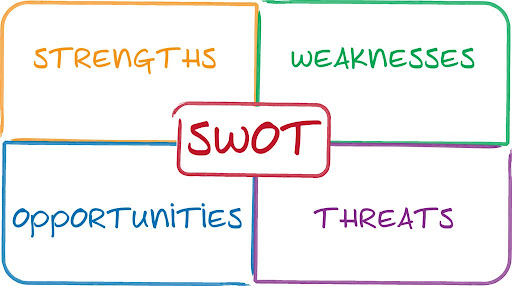If you’ve ever taken a high level business class in college, you may have learned about a SWOT analysis. SWOT stands for Strengths, Weaknesses, Opportunities, and Threats. It is an analytical tool that many businesses use to analyze internal and external factors that will affect the company’s future performance. One of the reasons that it’s so popular is that it’s easy to use and understand. Although it’s intended to analyze businesses, it can also be applied to your personal finances as well. With a little thought and a couple of minutes, you can figure out how well you are doing financially, what areas you can improve upon, and then use this data to better plan for your future finances.
What are your financial STRENGTHS?

Like this, but for your money.
“Ask yourself these questions: What are your strong areas in finances? Do you have a balanced budget each month? Did your income recently increase? Are you debt free?”
A financial strength is simply a financial or money related “good thing” that you are in possession of or have the ability to do. These strengths include things ranging from savings accounts to financial know-how.
For some people, this might include having a degree or two in accounting or taking budgeting courses. For others it might be a more practical strength such as receiving a new raise or having over $12,000 in your retirement accounts. However, financial strengths can be as simple as having a balanced budget or having an emergency fund. Even something as small as being able to account for every dollar that you spend (even if it’s going to the “wrong” places) can count as a financial strength.
What are your financial WEAKNESSES?

There's always a weak link or two.
“Helpful questions: Have you maxed out your income potential in your current job? Are you in debt? Are you living paycheck to paycheck?”
There’s no shame in having weaknesses; we all have them. However, the key to improving your financial health is to identify your weakness and learn to work with and/or around them.
For many people, an obvious weakness right now is their debt, be it school loans, car loans, a mortgage, or even medical bills. For other people, their weakness might be having no idea where their money gets spent each month. Others might have a weakness for overspending on clothes or coffee or a nice car. Whatever your personal weaknesses are, it’s important to be honest with yourself when considering your finances.
What are your financial OPPORTUNITIES?

Where might you get more money?
“Financial opportunities: Freelance work, tax preparation, consulting, writing, crafts, overtime, investing, earning a promotion, selling items on Ebay or Craigslist, debt consolidation, eliminating exposure to poor investments, reducing investment fees, downsizing your house, buying a more fuel efficient car, etc.”
Financial opportunities is just a fancy way to say, “ways to make money.” For some people, this might mean selling unwanted goods on Facebook marketplace or Craigslist. Other people might consider starting a side business doing freelance work, consulting, or crafting. You might also consider upgrading appliances around the house and yard to be more energy or fuel efficient.
That being said, not everyone will be in a place with clear financial opportunities. Maybe you’re recovering from a car accident or are serving as caretaker and don’t have the time or energy for side businesses or upgrades. There’s no shame in having limited opportunity; the point of this exercise is simply to explore your options and evaluate them honestly. It should NOT make you feel guilty or judged.
What are your financial THREATS?

Slightly different kind of threat...
“External factors to consider: Are you in danger of losing your job? What are the current economic factors that may affect your job/investments/income streams?”
As with financial opportunities, there might not be any clear and obvious threats, but it’s always a good idea to think through potential external factors. No one can predict a car crash (or a pandemic), but if you have an elderly relative or care for someone with high risk factors it might be wise to think through what would happen if they were to suddenly get sick or otherwise be unable to contribute to your household.
Additionally, you might have a secure job in a secure industry, but it’s good to keep an eye out on current political and economic movements. Does your job rely on imports from China or Russia? Is your company relying on dated technology? How are your stocks doing?
In Conclusion
Taking a SWOT is a good way for you to get an overall picture of the status of your financial health. While we’ve just discussed doing this with your personal finances, you can also do this with your business finances. In just a couple of minutes, you can get a better picture of how you or your business is doing financially and what areas you should plan for or work to improve.


